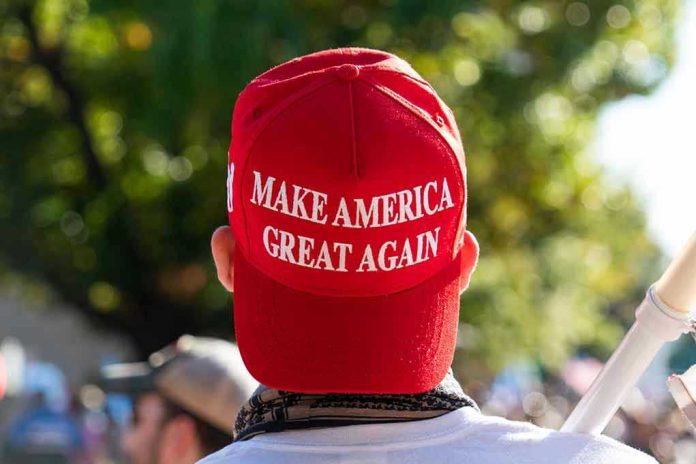
When a media personality makes a bold promise on national television, the internet never forgets—and neither does Donald Trump Jr.
Story Snapshot
- The View co-host Alyssa Farah Griffin promised in December 2024 to wear a MAGA hat on-air if Trump secured the release of all Israeli hostages
- Following a breakthrough hostage exchange in October 2025 that freed all 20 living Israeli hostages, Trump Jr publicly called for Griffin to honor her pledge
- Griffin praised Trump’s diplomatic achievement on-air but notably did not wear the promised MAGA hat
- The incident highlights the challenge of giving credit across political divides and the accountability media figures face for public statements
A Promise Made Under the Spotlight
Alyssa Farah Griffin stood before cameras in December 2024 and made a declaration that would come back to haunt her. The View co-host, who previously served as Trump’s White House communications director, told viewers she would don a MAGA hat on national television and personally thank Donald Trump if he managed to secure the freedom of every Israeli hostage held by Hamas. It was the kind of statement that sounds safe when the odds seem impossible—until they aren’t.
Griffin’s promise wasn’t made lightly or in isolation. She understood the gravity of the hostage situation, having witnessed firsthand the complexities of Middle East diplomacy during her time in the Trump administration. Her wager represented more than political theater; it acknowledged the near-impossibility of what she was proposing. Negotiating with Hamas for a complete hostage release had eluded countless diplomats and world leaders. The promise felt like a safe bet.
The Diplomatic Breakthrough Nobody Expected
October 2025 delivered what many thought unachievable. Israel and Hamas completed a hostage exchange that resulted in the release of all 20 living Israeli hostages. Trump, working alongside Steve Witkoff and his son-in-law Jared Kushner, had engaged in direct negotiations with Hamas—a controversial approach that nonetheless yielded results. The president hailed the breakthrough as “a new beginning for an entire beautiful Middle East,” claiming credit for diplomatic success that surprised even seasoned observers.
The mechanics of the deal remain complex, involving prisoner exchanges and ceasefire agreements that required delicate balancing of competing interests. Trump’s willingness to negotiate directly with an organization designated as a terrorist group by the United States raised eyebrows across the political spectrum. Yet the outcome—families reunited with loved ones after months or years of captivity—proved difficult to dispute regardless of one’s political leanings.
The Social Media Reckoning
Donald Trump Jr wasted no time reminding Griffin of her December promise. As news of the hostage release spread, Trump Jr retweeted Griffin’s original statement, effectively putting her on the spot before millions of social media users. The move exemplified the power of digital accountability in modern politics, where video clips and written statements live forever in searchable archives. No longer could public figures make bold declarations and hope they would fade into obscurity.
The younger Trump’s challenge sparked immediate debate across social and traditional media. Supporters argued Griffin should honor her word, viewing her promise as a binding commitment made before witnesses. Critics countered that demanding she wear a MAGA hat reduced a serious diplomatic achievement to partisan theatrics. The controversy revealed deeper tensions about how Americans process good news when it comes from political opponents.
When Praise Isn’t Enough
Griffin addressed the situation during her next appearance on The View, offering fulsome praise for Trump’s diplomatic achievement while conspicuously not wearing the promised MAGA hat. She credited Trump and his negotiating team, expressed hope for lasting peace, and acknowledged the significance of the breakthrough. Her words were generous and seemingly sincere, recognizing accomplishment across political lines in a media environment that rarely encourages such grace.
Yet words without the symbolic gesture felt incomplete to many observers. The MAGA hat carried meaning beyond simple headwear—it represented a public acknowledgment that transcended mere verbal recognition. Griffin’s decision to praise without fully honoring her promise raised questions about the nature of commitments made in hyperbolic political discourse. Can we hold people to statements made in hypothetical scenarios? Should we?
Beyond the Hat
The substance beneath this theatrical dispute deserves attention. Twenty families reunited with loved ones represents a genuine diplomatic achievement regardless of who receives credit. The hostages’ return matters infinitely more than any media personality’s wardrobe choices. Yet the public fixation on Griffin’s promise reveals something important about how Americans process political information and assess accountability in public figures.
Griffin’s willingness to praise Trump, even without the symbolic hat, stands out in an environment where acknowledging opponents’ successes feels increasingly rare. Her response, though incomplete by the terms she set, demonstrated more grace than many political commentators show toward their adversaries. Whether that proves sufficient depends largely on individual perspectives about the nature of public promises and the importance of symbolic gestures in political discourse.



